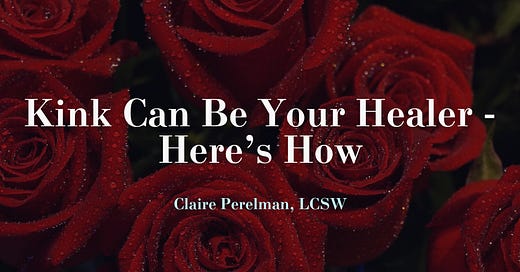If you’ve ever experienced challenging sexual dynamics (and let’s be honest, who hasn’t?), sexual trauma, or just generally existed in our sex-negative culture, having sex can often be a difficult thing. It can be anxiety inducing, emotionally challenging, and difficult to navigate. There are many ways to navigate these challenges, but one powerful option is often overlooked: engaging in kink and BDSM as a pathway to sexual healing.
Kink is often portrayed as something sinister, dirty, or perverse. When it’s discussed positively, it’s usually framed as something fun you can use to “spice things up” in the bedroom. But both of these narratives miss kink’s healing potential - a felt sense of sexual safety, a safe container to re-engage with difficult themes, and a practice of reclaiming one’s sexual power and autonomy.
Before we go any further, let’s define some things. Kink is an umbrella term that encompasses unconventional and/or taboo sexual practices and fantasies, done consensually. It can include power play, impact play, role play, and many other dynamics. You are probably familiar with BDSM, a subset of kink, which stands for bondage and discipline, dominance and submission, and sadism and masochism.
Kink and BDSM dynamics can be incredibly intense, vulnerable, and potentially very triggering. It is absolutely vital that any kinky play feel safe, consensual, and grounded in trust. Even with detailed negotiations and the use of safe words, kink can sometimes feel re-traumatizing. For the purposes of this article, I am only talking about kink/BDSM practices that are clearly defined, collaboratively negotiated, and consensual.
Kink is much more common than most people think. Over 50% of both Gen Z and Millennial populations report having kinky fantasies. More and more mainstream media include depictions of kink or BDSM, such as this year’s Babygirl. And none of us can forget the rise to fame of 50 Shades of Grey.
Being interested in kink is often inaccurately linked to having experienced trauma. This leads people to wonder if experiencing trauma automatically means you’re kinky, or if being kinky means you have a history of trauma. Let me be clear - the answer is no. You can be kinky without having experienced trauma, and you can have experienced trauma without being kinky.
What is discussed far less often is how kink can actually be deeply healing for those who have experienced trauma.
A 2021 study1 explored the “curative aspects of kink” and reported in depth how engaging in positive kink dynamics, working with a kink-positive therapist, and being integrated within a kink-positive community supported participants’ experience of healing traumatic experiences.
Felt sense of sexual safety
Kink provides an environment where sex happens specifically within one’s boundaries. With its emphasis on specific and enthusiastic negotiation, a kink scene can become a healing alternative to past experiences where boundaries were crossed - or not even discussed at all.
For our brains and bodies to create new neural pathways around sexual play - to integrate that sex can be safe, approachable, and even pleasurable - we have to be able to practice this felt, or experienced, sense of safety. Being able to engage in thoroughly discussed and agreed-upon sexual play, while always being able to advocate for a complete stop using a safe word, can be the reparative experience we need.
Safe container to re-engage with difficult themes
A kink scene or dynamic creates a safe container within which we can explore sexual dynamics, acts, or fantasies that have previously been difficult, challenging, or connected to traumatic experiences. We can explore within this container as much or as little as we want; the emphasis on safety, choice, and discussion can be healing in and of itself.
Enthusiastically and relationally engaging with pieces of our sexuality that are drenched in shame creates the opportunity for the (potentially novel) experience of mutual acceptance, shared pleasure, and emotional repair.
Practice of reclaiming one’s sexual power and autonomy
For many people, sex has been a place in which they’ve felt a lack of power or choice. Kink presents the opportunity for the exact opposite of this experience.
Voicing our specific desires, understanding where our hard limits are (and having them respected), and centering pleasure within kink dynamics delivers the groundwork to build our trust in our own sexual power and autonomy. With the reclamation of this sexual freedom, we can feel even more confident in pursuing our desires and maintaining our limits.
Kink can be your healer
An often under-explored avenue, kink can be the surprising way to experience sex and sexuality in a safe, pleasurable, and supportive environment. Having this positive, co-created experience within which to explore can be deeply transformative.
Kink can hold the pain of our past while paving the way towards a sexually liberated and empowered future.
Cascalheira, C. J., Ijebor, E. E., Salkowitz, Y., Hitter, T. L., & Boyce, A. (2021). Curative kink: survivors of early abuse transform trauma through BDSM. Sexual and Relationship Therapy, 38(3), 353–383. https://doi.org/10.1080/14681994.2021.1937599



